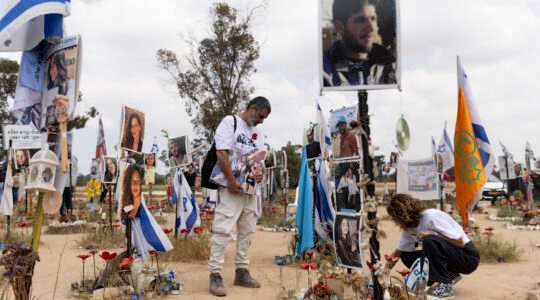JERUSALEM (JTA) — People historically have associated the Jewish National Fund with planting trees in Israel. Now the century-old charity is also working to make sure that Israelis will have decent places to put good wood on the ball.
The organization’s latest venture, Project Baseball, aims to develop baseball facilities in Israel for the country’s nearly 2,300 amateur players.
Baseball has seen a rise in popularity in the State of Israel, but inadequate and unmaintained facilities have hampered its progress.
“People really love it,” said JNF spokeswoman Jodi Bodner, who described baseball as “great team sport” and credited its recent spike in popularity to the fact that it offers Israelis “a different kind of recreation.”
With funds raised by Project Baseball, JNF has helped refurbish several fields across the country. Work is under way on a state-of-the-art sports park in Kibbutz Gezer, not too far north of Jerusalem.
JNF also recently completed work on Sportek Field just outside of Tel Aviv, which hosted the 2009 Maccabiah Games baseball competition.
Baseball was introduced to the Holy Land in 1927, when the governess of a Jerusalem orphanage tried to engage her children in a game. According to popular accounts, the sport was so alien to the children that they dropped the baseballs to the ground and kicked them like soccer balls.
It wasn’t until five decades later, in 1979, that the first true Israeli baseball field was erected. The sport has found a strong base in Jerusalem, where hundreds of residents, adults and children, take part in league play. However, the city has only one baseball field — and it’s in poor condition, devoid of grass and instead covered with rocks, dust and thorns.
Other fields in Israel face similar problems. Baseball is regularly played in Bet Shemesh, but the town’s lone field is constructed on a slope, forcing players to run uphill to first base. A field in Tel Aviv is not equipped with lights, forcing play to end at dusk. The cities of Haifa, Beersheba and Tiberias also boast players but no fields on which to play.
Inadequate facilities have not been baseball’s only obstacle in Israel. Project Baseball, though now a solo effort by JNF, at one point was working in conjunction with the Israel Baseball League. The professional league’s only season came in 2007, attracting players from the United States, Canada, Venezuela, the Dominican Republic, Australia, Europe and Israel.
Financial difficulties struck out the 2008 season, and the league’s front man, David Solomont, is facing legal challenges. Solomont filed for Chapter 11 bankruptcy in April, according to papers submitted to the U.S. Bankruptcy Court in Boston.
Despite the hiccup, Project Baseball is working toward advancing Israeli baseball. The JNF says its motivation stems from the belief that baseball is more than just a game.
In 2005, the Israel Association of Baseball hosted a clinic for 80 Israeli-Arab and Jewish students, teaching them the game’s basics and then having a game on a Tel Aviv field. According to JNF’s Web site, “the setting of a baseball field gave them a rare opportunity to interact and work together.”
Instances of cooperation and unity, JNF says, are what make baseball a unique fit for the land of Israel.
Bodner says there is a need for the diamond game there.
“We see a need,” she said of JNF, “and we try to go fill it.”
JTA has documented Jewish history in real-time for over a century. Keep our journalism strong by joining us in supporting independent, award-winning reporting.





